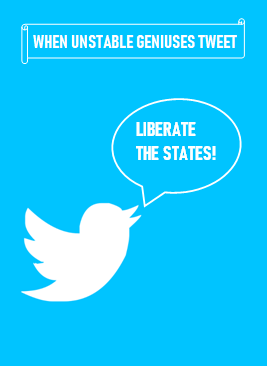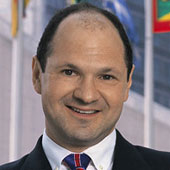Trump and Musk: Two Unstable Geniuses Compared
Recognizing what constitutes reality is a minimum job requirement for any leader. While Donald Trump often appears delusional, Tesla and SpaceX CEO Elon Musk is so only part of the time.
May 11, 2020

Donald Trump and Elon Musk, with their 80 million and 33 million followers, respectively, are two of Twitter’s biggest stars. However, their characters certainly do not fit the image of a sweet little bird tweeting on a tree branch.
Rather, both men use Twitter’s 280-character format as a vehicle for psychotic outbursts in which they combine attacks on critics with bouts of self-pity — as well as a lot of outright nonsense and craziness mixed in.
Going off script
True, Elon Musk does it only periodically. In between, he does act like the visionary entrepreneur that he primarily is. But when he veers off that techie/geeky script, he causes the collective jaw of his millions of followers to drop in shock.
In many ways, Musk is the personification of what psychologists have long found: There is a fine line between genius and insanity.
In contrast, Donald Trump regales his one-and-a-half time larger pool of followers on a daily basis with a steady barrage of usually ridiculous and evidently deceitful tweets. Donald Trump could be better summed up by the late American concert pianist and comedian, Oscar Levant, who once said: “There is a fine line between genius and insanity. I have erased that line.”
Two stereotypes in action
The two men are not just a pair of “unstable geniuses” but, as even audiences far removed from U.S. shores can easily see, each of them represents a different enduring American stereotype.
Musk is the proverbial crazy inventor, one of those who have been popularized by Hollywood since the days of silent movies. And Trump is, of course, a typical charlatan.
Assumed vs. real genius
Trump has bragged of being a genius — for example, declaring during the coronavirus crisis that he understood science and medicine. And before that, he claimed that he knew more about military matters than the generals at the Pentagon.
Trump is probably right — he is a genius, but a genius swindler.
Trump, the 21st century Wizard?
Since the early 19th century, all kinds of snake oil medicine hawkers traversed the enormous country praying on the gullible. They were often portrayed in American literature, ranging from Mark Twain’s Huckleberry Finn to O’Henry’s short stories.
Ominously, in the 20th century, the confidence game became married to politics. Frank Baum’s prophetic Wizard of Oz, published appropriately enough in 1900, is a story about a dictator — a scammer who rules Oz by creating a happy illusion.
Of course, the wizard knows full well that he is deceiving his people, but they are willing to be deceived — because his lies bring them happiness.
The consequences of demagoguery
In the book, the wizard is benign. Donald Trump’s supporters see their leading man the same way. They resolutely believe that he has nothing but their well-being at heart.
In real life, these Americans might want to consider those Germans, Russians and Italians who fell under the spell of political swindlers in the first decades of the 20th century. With all the sources of information and fact checking readily available today, these folks should certainly know better.
Snake oil salesman or true genius?
Elon Musk, the South African-born 48-year-old, for all his accomplishments might also be viewed by some as something of a snake oil salesman.
While his Tesla car company sold only around 88,000 cars in the first three months of this year, Tesla’s market capitalization is around $130 billion.
That is nearly twice as high as Volkswagen’s market cap. The world’s largest car manufacturer sold almost 11 million vehicles last year and has a stable of highly diversified international brands, ranging from the Czech Republic’s Skoda to Germany’s Audi and Porsche.
Hello Mars, hello Earth
To his credit, Musk is very much aware of the trappings of “Life on Mars,” to reference David Bowie’s famous song. Where the late singer asks:
Oh man, wonder if he’ll ever know
He’s in the best-selling show
We can provide the answer: Yes, Elon Musk knows all about it.
How else to interpret that he tweeted recently, during one of his Twitter outbursts, that the company’s share price is too high?
Warren Buffett would agree. One of the United States’ most respected investors, known as the Sage of Omaha, noted in a recent interview that he wouldn’t invest in Tesla.
(And just in case you were wondering: Yes, as chance would have it, Omaha, Nebraska is the place where the Wizard arrives from Oz in a hot air balloon).
Sign of a true visionary and entrepreneur
Despite Tesla’s limited sales numbers, Mr. Musk has the formidable German automotive industry scrambling. They see the writing on the wall and are eager to get in on electric vehicle technology.
As a warning to the Germans, in neighboring Netherlands, a market where German cars used to be kings, Tesla Model 3 has become a hands-down best-selling car.
And even though China is a global leader in electric vehicle technology, it is Tesla that has come to symbolize the electric future for cars and trucks.
Trump only trumpets
Now, Donald Trump is also eager to take on both the Chinese industrial might and the German car industry. But not being an inventor — and, for that matter, very far removed from being an economic genius — Mr. Trump wants to do it the only way he knows how, by imposing tariffs.
The sitting U.S. president wants to do all this even though the world is facing the greatest economic collapse since the Great Depression, which took place in the early 1930s.
Economists have long declared that, back then, protectionism, and specifically the Smoot-Hawley Tariff Act passed by U.S. Congress in 1930, ended up being the real culprit.
Far from serving their presumable purpose of saving domestic jobs, that law made the Depression far worse for every country involved.
Now for the bad news
As was stated at the outset, Elon Musk has his awful periods on Twitter. His current rage denying the dangers of the seriousness of the pandemic and demanding that his factory be allowed to open are not just the latest, but perhaps the most egregious case.
In fact, on April 29th Musk tweeted in all capital letters: FREE AMERICA NOW. That Nearly mirrors Trump’s encouragement of mass demonstrations in Michigan and other states under lockdown to “liberate” these states as he called it.
The true shame for Mr. Musk is that, on this matter, no matter how absurd he tries to be, he will forever be solidly behind the curve of Donald Trump, demanded such an act of idiocy two weeks earlier.
Three conclusions
The difference between Musk and Trump is that Musk’s occasional delusional tweets only hurt his credibility and maybe the viability of his businesses.
In contrast, Donald Trump’s daily barrage of insane tweets and policy decisions actually cost lives — many, many thousands of them.
Maybe the world can live with the borderline insanity of Elon Musk. However, it is bound to become a very dark place given the wide-ranging displays of near-insanity of the man in the White House.
Takeaways
Musk and Trump each represent a very different American stereotype. Musk is the crazy inventor and Trump is a typical charlatan.
With his limited faculties to recognize reality, Trump is delusional most of the time. That finding applies to Musk only part of the time.
As is the case with The Wizard of Oz, Trump’s supporters believe that he has nothing but their well-being at heart.
The difference between Musk and Trump is that Musk’s occasional delusional tweets only hurt the credibility of his businesses.
Trump’s daily barrage of insane tweets and policy decisions actually cost lives -- many, many thousands of them.


